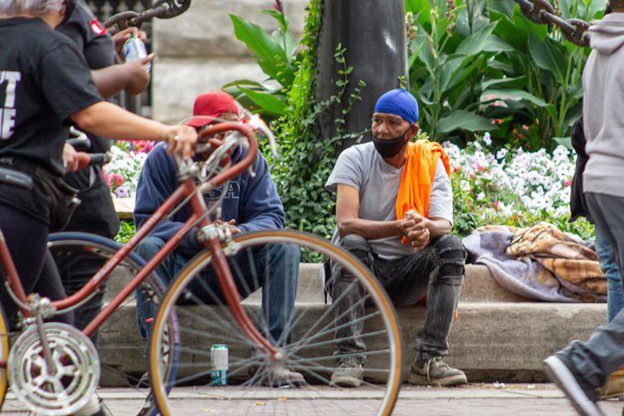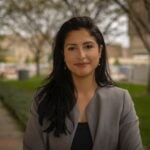Nearly two years into the coronavirus pandemic, there are still a lot of unanswered questions and uncertainty about what the future holds. But along the way, COVID-19 has handed society the biggest natural experiment in health and economic equity — and social scientists say the scorecard is far from stellar.
“This was completely foreseeable,” said Tess Weathers, research associate at Indiana University Richard M. Fairbanks School of Public Health. “We have seen many examples in the past where crises bring to the surface unfairness in the structuring of society.”
Weathers said COVID-19, like Hurricane Katrina, has highlighted long-standing inequities. During such crises, socially disadvantaged groups — African Americans in particular — bear the brunt of the suffering.
The disparities are seen around the globe. Racial minorities and lower-income communities — in the U.S. and abroad — have been hit the hardest.
A look back at 2021 offers insight into why that’s the case and what can be done about it.
January 2021: Vaccination is bittersweet for those with family overseas
One-third of all U.S. doctors are foreign-born, and many of them are recent immigrants. Those on the frontlines fighting COVID-19 since the start of the pandemic were also at the front of the line for vaccines when they became available in late 2020.
“I got my vaccine even before the president of the United States,” said Dr. Wassim Abdallah, a Lebanese physician at Indiana University School of Medicine, who was an internal medicine resident at the time.
All of Abdallah’s family and friends are still in Lebanon. His feelings of pride and gratitude for getting the vaccine so early were tainted by the fact that back home in Lebanon there were no vaccines in sight. His 102-year-old grandfather was not yet vaccinated, and neither were his parents.
Abdallah’s co-resident, Dr. Samuel Urrutia, from Honduras, shared the same sentiment. For him, it felt like his life mattered more just because he is in the U.S. serving Americans. His father, a physician in his 50s in a rural Hounduran village, was not vaccinated and had no idea when a vaccine would be available for him. Urrutia lost some of his medical school friends who were still back home fighting the pandemic.
“It feels like their lives did not matter,” he said. “You are made to feel like you are expendable.”
In many of these immigrant doctors’ minds, the pandemic has made it clear that where people are born affects the value ascribed to their lives — and only the “lucky ones” in higher-income countries like the U.S. get a fighting chance during a global health crisis.
But as physicians, Abdallah said, the pandemic also made clear that even within the U.S. not all Americans are on the same footing or have an equal chance at a good quality of life.
June 2021: Vaccines are in, masks are off
Despite a rocky rollout, many Americans were able to get the COVID-19 vaccine by mid-2021. But across the U.S., white and affluent Americans got vaccinated at higher rates compared to Black Americans. Public health experts pointed to barriers, including lack of access to transportation and technology to sign up for the shot, inability to take time off work to get the vaccine, misinformation regarding the safety and efficacy of vaccines, and lack of trust in medical institutions.
Not too long after, mask mandates were lifted in many states, including Indiana, for people who were fully vaccinated. The altered policies, which were supported by public health guidance at the time and were based on the honor system, were a reason to celebrate for many who had grown tired of masking up everywhere they went.
But 25-year-old Torian Jones was not celebrating. Jones works at Cleo’s Bodega — a local nonprofit grocery store in Indianapolis’ near northwest side neighborhood. He said he was terrified, since grocery store workers cannot do their jobs from home and deal with hundreds of unmasked shoppers indoors every day.
Until June, Jones was still unvaccinated despite being eligible. He said he barely had time to go get the shot. At that time, no clinics were within walking distance from where he works and lives. He felt he was constantly in “survival mode.”
Employment situations like Jones’ — that do not offer adequate pay and benefits and that may put the employee’s health at risk — put people in a difficult situation, said Emily Ahonen, an assistant professor at IU’s School of Public Health. COVID-19 made it clear that people’s jobs have a direct impact on their health, she said.
“When our systems are shaken and disrupted as they have been by the pandemic, those people whose employment was most precarious to begin with are the first ones to suffer,” Ahonen said.
Black and brown Americans are more likely to be “precariously employed” than white Americans, Ahonen said. And COVID-19 made the impact of that very clear.
The U.S. has seen nearly half a million extra deaths compared to before the pandemic, but not all of these deaths were due to COVID-19. Researchers at the University of Notre Dame analyzed data from the U.S. Centers for Disease Control and Prevention and found that while Americans overall have lost a year and a half of life during 2020, Black and brown Americans have lost the most years — a drop of 2.8 years for Black Americans and 3.7 for Hispanic Americans.
“We’re finding that 70% of the non-COVID excess deaths are among Black and brown people. So it’s a really, really striking figure,” said Christopher Cronin, assistant professor of economics at Notre Dame and co-author of the study “Folks who were dying for non-COVID reasons, they’re dying at younger ages, and so we’re losing a lot more life years.”
This story comes from a reporting collaboration that includes the Indianapolis Recorder and Side Effects Public Media — a public health news initiative based at WFYI. Follow Farah on Twitter: @Farah_Yousrym.











